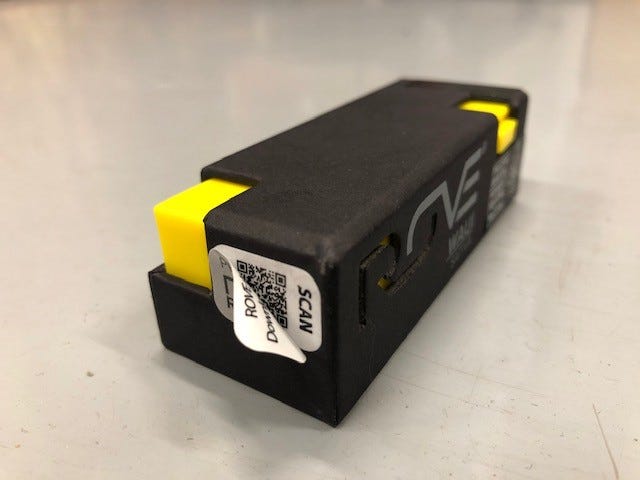After new reports of lung illnesses caused by legal THC vapes, cannabis advocates and opponents can agree on one thing: Government officials should give consumers more information about where the dangerous products were purchased.
The warnings about vaping, prompted by the national lung injury outbreak the Centers for Disease Control and Prevention said Thursday has sickened 2,409 and left 52 dead, began with no distinction between nicotine and marijuana-based THC. It then grew to emphasize black market, street-sold THC cartridges, and now includes legally purchased products containing THC, the ingredient in marijuana that creates a high and is vaped in oil.
At least eight states have reported lung illnesses linked to legal THC cartridges. But unlike consumer products and some food, identifying information about the products and stores that sold them isn't available.
"We have no idea how states are determining where people got vapes from or what they are asking," said Kevin Sabet, co-founder of the advocacy group Smart Approaches to Marijuana. "We need to have more accurate reporting on the vape issue."
Six vaping-related injuries in Massachusetts are linked to legal-market THC cartridges, and all 20 people so far sickened or killed with vaping-related disease in Oregon used THC bought from legal sources, state officials reported. The other states with lung illnesses linked to legal vape products are Michigan, Delaware, Maryland, Colorado, Utah and Washington.
The Centers for Disease Control and Prevention reported 152 different products were used by the 482 hospitalized patients who used THC vapes and provided information about the products they consumed. The four most common brands included two that are sold legally.
CDC said it doesn't have information on where patients bought products so can't provide those details. Spokeswoman Nicole Elliott said its surveys don't "go into this nuance, and we don’t have specific information on where each individual product was purchased based on the self-reported questionnaires."
Sabet said his group only found out about the six Massachusetts cases after it filed a Freedom of Information Act request.
Shaleen Title, one of the five commissioners on the Massachusetts' Cannabis Control Board, pushed for more collaboration between the board and the state health department, which agreed to share more information late Friday. The department declined to disclose the names of the dispensaries.

"I think it’s very important that we’re transparent and that we share with the public the information we have, the illnesses people have and the products the people who became sick are using," said Title. "Users need to be empowered by that information."
Government officials report vitamin E acetate, which is sometimes used as a thickening agent or to dilute THC oil in vape cartridges to make it go further, is the only additive so far linked to the lung illnesses and death.
The CDC found 15% of the hospitalized patients surveyed nationwide used the legally sold brand TKO and 12% used the Rove brand, which also is legal to purchase. The majority of patients, 56%, used the illicit brand Dank Vapes. A lesser known illegal brand Smart Cart was linked to 13% of patients.
Rove "has never and will never use vitamin E acetate nor any other fillers in its authentic vape products," the company's sales and marketing vice president Mark Hsieh said in a statement. Food and Drug Administration investigators discovered fake Rove cartridges with vitamin E acetate, said Hsieh.
Why isn't vitamin E acetate illegal? People are vaping a deadly substance along with THC
Rove introduced a "QR Code Authentication Program" in March of 2019 so consumers can tell if a product is authentic. Products with only barcodes are not authentic, Hsieh added.
TKO could not be reached for comment, but Robert Kayvon, who owns the website DabConnection where he writes as "Bert Blaze," has written about the counterfeiting of both TKO and Rove cartridges.

Elliott said CDC is continuing to test tissue samples for "a variety of chemicals of concern that could be present in e-cigarette, or vaping products, including THC, CBD, and nicotine containing products."
Most state and federal officials are urging people to avoid all vaping until the exact brands and additives causing the illnesses and deaths can be conclusively identified.
While some states and cities, including San Francisco, banned only nicotine vapes, Massachusetts' prohibition went the farthest, initially banning all vaped products including THC oil, nicotine and marijuana flower extract, which are oil-free and haven't been linked to any illnesses.
"It's a matter of being specific," said Title, the state cannabis board member. "If we know the distinction, we should be saying it."
What to know:Recreational marijuana is legal in Michigan and will soon be legal in Illinois
Massachusetts Gov. Charlie Barker on Wednesday lifted the ban on all nicotine and THC vaping products at the same time the state issued regulations effective June 1 banning the sale of flavored nicotine e-cigarettes outside of "licensed smoking bars."

And on Thursday, the Cannabis Control Board amended the quarantine on all THC vaping products to permit the sale of devices used to vaporize marijuana flower for adult and medical use of marijuana and certain, devices not used for marijuana and other newly manufactured devices proven to not contain vitamin E acetate or other contaminants.
Dr. Sharon Levy, a pediatrician and Harvard Medical School associate professor who heads the substance use program at Boston Children's Hospital, says she isn't surprised that dispensary marijuana was linked to lung illnesses.
"There were all these claims about vapes being safe and there was not a lot behind it," said Levy. "We really just don’t have a good system for regulating this stuff."
If you or family members are struggling with issues mentioned in this story and you would like to connect with others online, join USA TODAY’s "I Survived It" Facebook support group.